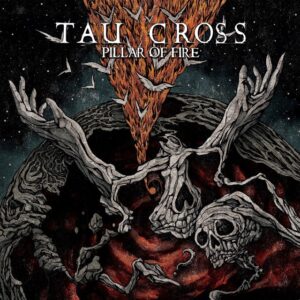
Featuring Rob ‘The Baron’ Miller of legendary crust-punks turned post-metal warriors Amebix alongside members of Voivod (Michel ‘Away’ Langevin), War/Plague (Andy lefton) and Misery (Jon Misery), Tau Cross are a multi-national collective whose sonic assault takes in tribal rhythms, towering guitars and, at the heart of it all, Miller’s dark vocals. Multi-faceted, Tau Cross refuse all attempts at pigeon holing and ‘Pillar of fire’ continues to explore hitherto unheard sonic territory with a fire that has all but burnt out of the modern world.
Opening with ‘Raising Golem’, a sinister invocation that takes time in emerging from sheets of dark noise, the band edge into the industrial-tinged post-punk territory of Killing joke, albeit with Miller’s spectacularly worn vocals adding a dilapidated edge to that band’s glacial sound. With stabbing riffs and a relentless beat, it’s not only a blistering opening track, but also an impressive showcase for the near-perfect production that the band have achieved on the album with a sense of separation between the instruments seemingly in spite of the heaviness on display. ‘Bread and circuses’ summons the spirit of ‘sonic mass’-era Amebix with its unnerving vocal, tribal percussion and angular riffing crafting a melody and atmosphere that is uniquely dark and earthen in nature. Gothic sensebilities are given free reign via ‘on the water’, a melodic, almost pop-infused piece of music that is gritty and yet deeply catchy as well. Things do not remain quite so driven, however, and the throbbing bass of ‘deep state’ draws the listener into a darker place, where light rarely penetrates and only The Baron’s voice remains, exhorting you to eschew the trappings of modern civilisation for a more natural existence. Heading off, once again, into new territory, the album’s title track, ‘pillar of fire’ is an acoustic track that sounds like Harvestman covering Sisters of Mercy, Rich with pagan imagery and evocative of a time long passed, it’s easy to understand why the band chose ‘Pillar of fire’ to be the album’s title track. The first half of the record concludes with the churning brutality of ‘killing the king’, a ferocious blast of post-metal that grinds away the listener’s will to resist over the course of its near-six-minute run time.
‘The second half of the album kicks off with ‘A white horse’, an ideal single at three minutes and with a heavy, driving riff at its heart. In contrast, the acoustic picking of ‘the big house’ contrasts a gothic vocal with the elegiac, acoustic work of Michael Gira’s solo work. There’s a folk sensibility at work here that tells of communities desecrated by warfare, before a gargantuan, grinding riff slices into the body of the song, bringing the rampaging destruction vividly to life. A short, punky track, ‘RFID’ is Tau Cross at their angriest whereas ‘Seven wheels’ adds synth embellishments and a groove laden riff that slips effortlessly under the skin and lodges itself there. A late album highlight, ‘seven wheels’ is an awesome display of the band’s sonic arsenal before the doubt-ridden ‘what is a man’ closes this most diverse of records on a thoughtful note.
Where many bands are content to exist within rigidly defined boundaries, rarely stretching beyond their comfort zone, Tau Cross appear not to have a comfort zone as such. Each song is coherent in its place as part of the larger album and yet musically distinct, the band employing whatever style is appropriate to the subject matter of the track. The result Is an album that journeys across a vast, long-lost landscape, taking in rage, sorrow, horror and awe as it goes. Few bands would be brave enough to attempt such a journey, even fewer would pull it off with such aplomb. An album for those who believe music to be an art form and not a form of commerce, ‘Pillar of fire’ is heavy, beautiful, tormented and ecstatic all at once. An album to drive away the demons of the present, it is a towering work of art that will lie deep in the hearts of those who embrace it. 10



